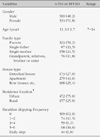Abstract
Purpose
To investigate the frequency of breakfast skipping and affecting factors in children in poverty.
Methods
The subjects were 644 children who were receiving the services of community child center or delivery meal-box. They were asked about their socio-demographic characteristics, health behaviors and breakfast-skipping status in the survey.
Results
Breakfast-skippers were 17.4% of the subjects. The count of negative health behaviors in breakfast skippers was higher than that in eaters, and the behaviors of exercise, screen time, alcohol experience, and smoking experience were worse in skippers than in eaters. The odds ratio of breakfast skipping was higher in female children (OR=2.53, p<.001), those with single father (OR=3.76, p<.001) or single mother (OR=1.83 p=.030), those with alcohol experience (OR=1.82, p=.022) and smoking experience (OR=2.80, p=.003), and under-weight ones (OR=2.54, p=.048).
Figures and Tables
References
1. Bang YM, Kim KY, Lee MS, Na BJ. A study on the related factors of skipping breakfast in elementary students. J Korean Soc Health Educ Promot. 2006; 23(3):17–35.
2. Byun MH. The survey of need of meal skipping children-status of Chunan. J Chunam Univ. 2006; 13:371–385.
3. Chung SJ, Lee Y, Kwon S. Factors associated with breakfast skipping in elementary school children in Korea. Korean J Community Nutr. 2004; 9(1):3–11.
4. Isacco L, Lazaar N, Ratel S, Thivel D, Aucouturier J, Dore E, et al. The impact of eating habits on anthropometric characteristics in French primary school children. Child Care Health Dev. 2010; 36(6):835–842.

5. Jang YA, Lee SH, Kim BH, Lee Y, Lee HJ, Moon JJ, et al. Revised dietary guidelines for Koreans. Asia Pac J Clin Nutr. 2008; 17:Suppl 1. 55–58.
6. Joo EJ, Kim IS, Seo EA. Determining the Frequency of Obesity and Eating Habits of Older(4th, 5th, 6th grade) Elementary School Students in Iksan City by Some Obesity Indices. Korean J Community Nutr. 2001; 6(1):16–27.
7. Keski-Rahkonen A, Kaprio J, Rissanen A, Virkkunen M, Rose RJ. Breakfast skipping and health-compromising behaviors in adolescents and adults. Eur J Clin Nutr. 2003; 57(7):842–853.

8. Kim HK, Yoon CH, Lee EH, Lee KI, Moon CS, Lee YH, et al. Development of health promotion program for low income children in under-served area. Seoul: Management Center for Health Promotion;2007.
9. Kim M, Kim HK, Yoon CH, Lee EH, Ko SD, Kim YB, et al. Analysis of behavioral and environmental determinants of physical growth and development in poor children, and development of evidence-based strategies for the promotion of developmental health. Seoul: Management Center for Health Promotion;2007.
10. Kim SH. Children's growth and school performance in relation to breakfast. J Korean Diet Assoc. 1999; 5(2):215–224.
11. Kim YH, Ju HO. Elementary schooler's skipping breakfast. Korean J Child Health Nurs. 2004; 10(4):488–495.
12. Kim Y, Yoon J, Kim H, Kwon S. Factors affecting intention to participate in school breakfast programs of middle and high school students in seoul. Korean J Community Nutr. 2007; 12(4):489–500.
13. Korean Ministry of Health and Welfare & Korean Center for Control Disease. The 4th health and nutrition survey sheet. 2005. Retrieved May 1, 2008. from http://knhanes.cdc.go.kr/data.
14. Korean Ministry of Health and Welfare & Korean Center for Control Disease. National adolescent health behavior on-line survey sheet. 2007. Retrieved May 1, 2008. from http://yhs.cdc.go.kr.
15. Lee KL, Park YS, Hwang JA, Jang HJ. Health status of child in community child center and environment of care-giver. Seoul: Community Child and Information Center;2008.
16. Oh JA. Factors affecting the health behavior of elementary school children at a late school age. J Korean Acad Community Health Nurs. 2010; 21(4):458–467.

17. Park HA, Kang JH, Kim KW, Cho YG, Hur YI, Kim OH. Breakfast skipping, related factors, and nutrients intake of 5th grade students. Korean J Fam Med. 2011; 32(1):11–20.

18. Seo BK. Study on the factors associated with conditions of breakfast intake in elementary school children in Kyungnam province. Busan: Dong-A University;2009. Unpublished master's thesis.
19. Son HG, Lee YK. Development and evaluation of an elementary school nutrition education program to prevent breakfast skipping. Korean J Community Nutr. 2010; 15(6):740–749.
20. Stewart SD, Menning CL. Family structure, nonresident father involvement, and adolescent eating patterns. J Adolesc Health. 2009; 45:193–201.

21. Vereecken C, Dupuy M, Rasmussen M, Kelly C, Nansel TR, Sabbah HA, et al. Breakfast consumption and its socio-demographic and lifestyle correlates in schoolchildren in 41 countries participating in the HBSC study. Int J Public Health. 2009; 54:Suppl 2. 180–190.

22. Yeoh YJ, Yoon JH, Shim JE, Chung SJ. Factors associated with skipping breakfast in Korean children: Analysis of data from the 2001 National Health and Nutrition Survey. Korean J Community Nutr. 2008; 13(1):62–68.
23. Yi BS, Yang IS. An exploratory study for identifying factors related to breakfast in elementary, middle and high school students. Korean J Community Nutr. 2006; 11(1):25–38.
24. Yi G, Yoon J, Choo YJ, Chung SJ, Kwon YH. Effect of school breakfast service on attitudes toward breakfast and school breakfast of male middle school students. Korean J Community Nutr. 2009; 14(3):277–285.




 PDF
PDF ePub
ePub Citation
Citation Print
Print





 XML Download
XML Download